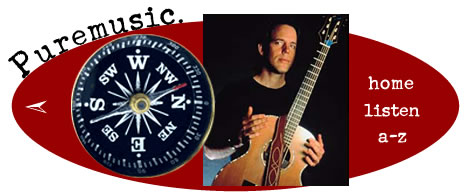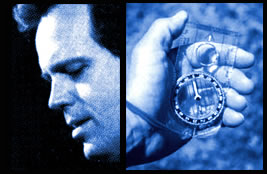
A Conversation with David Wilcox (continued)
PM: Well, I know you're busy. I'm going to ask you one more thing and let you go. Ten albums, it's hard to believe, ten albums into the game, and a sterling reputation made, what goals still lie ahead?
DW: What I would love to see is this: just about the time that I'm sort of bored with traveling around, I would love to become more of a writer. I find it kind of interesting that I've never pursued that at all. I mean I've never pitched a demo. I don't even know how to do it. [laughs] And so it would be really fun for me to learn about that, and write songs for other people. I'm good enough now at the craft that I would really love to not just tell my story and do my little quirky songs. But instead to come at song writing with a gracious heart, not trying to copy what the fad is, but thinking that there may be some songs that would really ring true for people that only I could write. And I could offer them up, and people could know them. It would be like, "Oh, you wrote that," kind of thing. You know?
PM: Right.
DW: And I think that would be a great thing to do. I love the idea of custom-made songs. My favorite thing would be if an artist had custom songs, made to order. Instead of just pitching a generic sort of song, it would fun if, say, some country artist said, "I wish I had a song about the way I fought with my brother, and now we're kind of estranged," or "You know, I really wish I had a song about my Mom dying." And I could make it completely personal, not just a song about a Mom, but put in enough details that I could sing it and know that it's real. And so then it would be like therapy. I could talk to them about it, get the real juice of the story, come back to them with a song, and it would just wipe them out. It would be great. [laughs]
PM: [laughs]
DW: And then I'd get to hear them do it. And they wouldn't just sing it like, "Okay, this is what I do for a living." They would sing it like, "This is my song, and nobody else can sing it. It was custom made for me." And that would be so satisfying. I would love to do that.
PM: I'm starting to move now into the publishing area, and I want to make a pitcher out of myself. So I hope that down the line I'll be talking to artists who voice a need like that, and I'll say, "Well, let me speak David Wilcox about it." And then pitch that song.
DW: It'd be kind of like writing for movie soundtracks, where they have the story and you make the emotional underpinning out of the music.
PM: Where you can look at the film and see, oh, that's the situation, okay.
DW: Yeah. But I love the idea of making it person-to-person. I know this woman who does paintings called Lifescapes, where she will, if somebody wants to give a painting as a gift, they tell the story of what this person has done with their whole life.
PM: Oh, my.
DW: And she makes a painting that incorporates all these elements, and makes it this beautiful journey. And so I love that same idea of being able to craft a song. Because what I love most about songwriting is that you go hear somebody do their songs, and when you leave, you know something about them that you didn't know before. And this is a recent thing. I mean, you can listen to every Frank Sinatra record there is, and you don't know anything about Frank.
PM: Absolutely.
DW: The quirky thing about what happened when Joni Mitchell started doing this, started really telling what it's like instead of trying to polish a public image, was that songwriting became more like writing to a friend, and really confessing and sharing what matters most. And so the singer/songwriter became this genre for a while. But of course the abuses of that are when it becomes like journal writing, too interior for people to really connect with it.
So I think the perfect evolution of that would be for the singer/songwriter to get out of his own journal, and use those skills but use them in this sort of Bodhisattva manner, use them in terms of, "Well, I can write for someone else, and I can write their story. And I can still make it as personal and as real and as wonderful. But instead of just doing self-portraits, I'll start painting other people. I'll start using that eye to look not just inside, but inside someone else's heart."
It's interesting that you asked this, because I've never really talked about this before. But I think it would be so satisfying to write songs that when somebody heard one on the radio they'd think the singer must have written it, because it sounds so true. I would love that.
PM: It's a beautiful thing.
Thanks so much for your time today. It's really nice talking to you.
DW: I feel the same. Sometimes interviews are, you know, more about the biz, and I'm glad that this was about what matters. Thank you.
•
 |
|
| print (PDF) | |
| listen to clips | |
| davidwilcox.com | |
| what are records | |
| archives | |
| links | |
| puremusic home | |